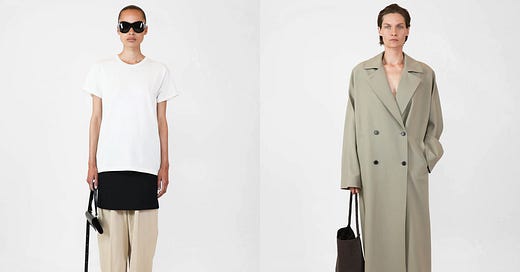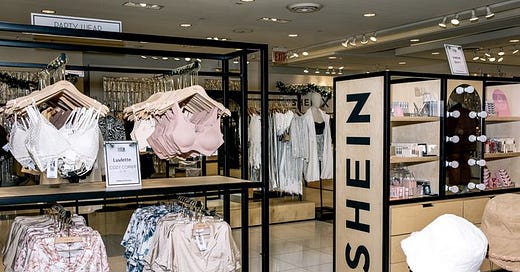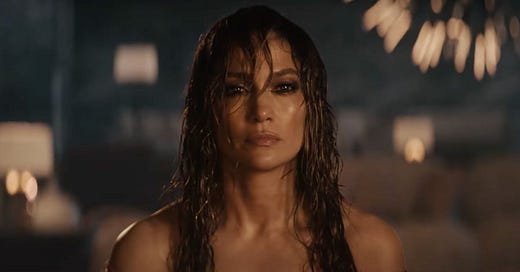

Discover more from Back Row
Fashion Week Beauty Triggers With Jessica DeFino
"When you put no-makeup makeup alongside a model who truly doesn't need the makeup, it gives people this hope that products are actually part of it."
Thank you for subscribing to Back Row! Today’s post is free to read, however this publication is made possible by paying subscribers. If you enjoy these stories and believe in independent fashion and culture journalism, free from pressure to kowtow to advertisers, I hope you’ll take the next step in your Back Row journey by upgrading your subscription. For $5 a month or $50 a year, you can read at least two Back Row posts per week, plus extra posts during fashion month, along with the full archive. You’ll also get access to commenting.
What paid subscribers are currently reading:
How fashion on the Venice Film Festival red carpet has been saving the movie business from itself.
The first fashion week recap, featuring Anna’s latest press tour and Christian Siriano’s show.

Jessica DeFino’s Substack The Unpublishable says everything legacy media won’t about the beauty industry, and is one newsletter I read religiously. I have long admired Jessica’s fearless voice on a beat that, in legacy publications, has huge financial stakes attached and therefore enormous restraints. Beauty brands often are among the biggest women’s media advertisers, leaving beauty editors to tailor their editorial approach to their business interests.
Beauty companies are also hugely significant to fashion week because their sponsorship dollars enable a lot of these shows to occur. To unpack the beauty side of fashion month, I called Jessica to get her perspective, because she will tell you what no other corporate fashion media entity can. Our conversation below has been edited and condensed for clarity. If you don’t subscribe to her Substack, get to it!
Beauty is second to fashion at fashion week, but it’s notable that beauty sponsorships go such a long way to powering the whole event. TRESemmé, for instance, is listed as one of NYFW’s main sponsors this season. What do you make of that?
I think fashion week, particularly beauty coverage and fashion week, is all about product promotion. Fashion week is just kind of this giant orgy of marketing and media colliding and each one feeds the other. It doesn't surprise me that these brands would be the big sponsors. When I was doing fashion week coverage, that is usually how we would get backstage exclusives or interviews with the makeup artist or hairstylists — we would go through the [beauty] brand that was sponsoring the show.
It’s been a while since I did backstage beauty coverage, but I seem to remember a lot of interviews with, like, nail artists talking about nude nails, wondering how much there really was to say about, well, nude nails. What do you remember about your past fashion week beauty coverage?
I actually went through some of my old fashion week reporting before we hopped on this call just to see what was I writing about? And all of [the seasons] were so similar. There's always a smokey eye, there's always a middle part, there's always dewy skin. Usually it's pretty minimal hair and makeup for the large majority of shows, and you have to spin this narrative out of absolutely nothing to make it seem exciting and new and worth buying this product that we have attached to these articles.
Do you have any predictions for trends we’ll see this show season?
I get so many press releases and so many emails from PR and branding about the skincare prep for a show. That is not part of anything that the viewer is seeing — it's a list of all of the sheet masks and eye masks, the moisturizers that were used before the makeup was applied. That's just always very funny to me.
One of the big trends we often see — especially during the New York shows — is no-makeup makeup.
I think the promise of no-makeup makeup is to make someone look like they are meeting the minimum standard of beauty that women especially are expected to meet without looking like they have put much effort into it. Usually that's a base or concealer, highlighter, blush, mascara, a brow gel, and a lip color. And that's sort of the bare minimum of beauty — clear, glowing skin, lush lashes, flushed cheeks, and a lifted brow. People are kind of like, Oh, look how effortless it is. This is good. I'm not using much beauty. Well, you're actually kind of perpetuating a huge lie about what people actually look like.
[At fashion shows,] when you put no-makeup makeup alongside a model who truly doesn't need the makeup, it gives people this hope that products are actually part of it, and, If I can use that product myself, if I put in enough effort, I will be able to emulate this effortlessly chic look. You're already set up to fail at that point.
Why do you think this look is so appealing right now?
I have to credit Glossier for a lot of it. I feel like this became a huge thing kind of starting in 2014, 2015. And if you look at some of their branding, it really emphasized that you would not notice these products. I wrote something about their perfecting skin tint once. They call it an “imperceptible wash of color.” That makes no sense. Don't you want to perceive it?
I really do think that this minimal look that is currently popular is a class performance. We collectively are funneling a ton of money into skincare, we're funneling a ton of money into injectables, Botox, fillers, even surgeries. All of those things are skyrocketing right now, and putting a wash of minimal makeup on top of it has this sort of wealthy appearance. Sometimes when you put in too much effort, it feels very gauche. It's like this low-key makeup is this marker of wealth, because in order to be able to pull it off, we know that you have funneled probably thousands and thousands and thousands of dollars into this invisible aesthetic labor of skincare and surgery and injectables.
Some in the fashion industry are predicting a post-pandemic boom as people return to their social lives. Do you think we’ll see the same thing in beauty?
I think we are seeing it now. Consumerism is over the top. We are buying more than ever, profits in the beauty industry are hitting record highs. I think people felt very out-of-control over the past three years and buying things is a way to exert control in a very socially acceptable and socially lucrative way.
Are there any particular trends you think we will see during this boom?
The big fashion month luxury houses have so many new beauty brands. So there's Hermès, Gucci, Dries Van Noten, Celine. We've seen this before with fashion week fashion houses that have their own beauty brands — like Victoria Beckham always uses Victoria Beckham Beauty. So I think that's going to be a huge promo point in some of the beauty media coverage. Even like Stella McCartney with her new skincare line, I guarantee you we’re going to hear like, “All this skin prep was done with Stella McCartney's skincare.”
The fashion industry has talked a lot about diversity and inclusivity over the last few years and made some strides on that front, but there’s more work to do. From your perspective, what needs to happen in order for the fashion shows to be truly diverse and inclusive?
The most obvious thing is that it can't just be in front of the camera, the diversity and the inclusivity has to be happening behind the scenes, which is a much taller order: Who is sponsoring the shows? What kind of products are they offering? What makeup artists are being hired? What hair stylists are working on these projects? Do they have experience with Black hair? Do they have the shade range for people of color? I just know from interviewing models that the backstage experience is still not up to par. I often see Black women on the runway — their hair will be natural and it's wonderful. But a lot of times it's because the stylist doesn't know what to do with it to fit it into the rest of the show.
[This infrastructure] is not something that you can build in a couple of seasons, especially the past few seasons, which have been very strange because of the pandemic. If you look at the history of fashion week, that's decades built on a largely white and exclusive platform, and it will take that amount of time to make it as diverse and inclusive as it needs to be.
The runways are much more diverse than probably ever before, which is great. But it’s limited. It’s not like they resemble, say, what you would see if you walked into the mall.
Because the fashion industry and the beauty industry do not want you to look at their main events of the year and think, Oh, this looks like walking into a mall. This is built on being exclusive and unattainable. And I think that's why it's been hard for them to pivot, to meet cultural demands of diversity and inclusivity, is because their foundation is just so far from that. That's not why they exist. They exist to exclude.
Do you think beauty trends are born on the runways these days? It seems to me like there is no shortage of enthusiasm for and experimentation with different beauty looks on the internet, so I don’t know that fashion week really serves that purpose for beauty anymore. Also, there aren’t nearly as many editors in offices having think tanks about which trends to promote in magazines, given the state of the media industry. They are pressured to cover viral trends that will get clicks.
I think ever since Instagram and TikTok have gotten bigger, it is much harder to pinpoint where trends originate. When it was just the industry sort of dictating these things, there was a reason for every trend that you saw. And I think the trend cycle, thanks to social media, is one, a lot shorter, and two, a lot more erratic and difficult to predict.
I do think a lot of beauty trends are born out of social and cultural circumstances. I do think that beauty is one of the sneakiest ways that systems of oppression are enforced. So when you look at the no-makeup makeup thing, and this rise of skincare and injectables, and all of this under-the-radar aesthetic labor, it really strikes me that we are seeing this uptick in aesthetic labor at the same time that we are seeing a labor revolution elsewhere. We're seeing historic unionizing rates, we're seeing quiet quitting and the end of the girl boss, and beauty rises up to meet that moment. It's like, if you're not going to put labor into your job, you are going to put labor into your face.
I think I know how you are going to answer this question but I’m going to ask for those who don’t: if you were going to advise somebody on how to achieve no-makeup makeup, what would you say?
If we're being true to the phrasing, I would say, wear no makeup.
Get more beauty coverage from Jessica DeFino at The Unpublishable and by following her on Twitter.
Subscribe to Back Row
The fashion and culture newsletter that publishes what legacy media can't.









